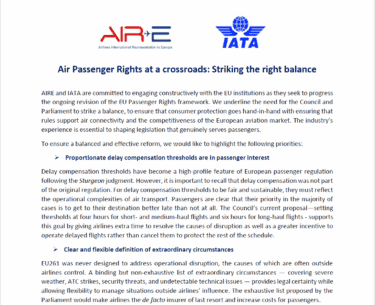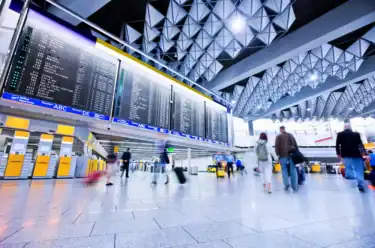The ReFuelEU Aviation Regulation is a key component of the EU’s Fit for 55 Package. It establishes a robust legal framework to drive the gradual integration and increased use of Sustainable Aviation Fuels (SAF) across Europe. This regulation is essential to the EU’s strategy for decarbonizing aviation by mandating SAF quotas for fuel suppliers and setting ambitious carbon reduction targets. Given the current high costs and limited availability of SAF, achieving aviation decarbonization will likely require a multi-faceted approach, including operational improvements, market-based measures, and the development of innovative green technologies.
AIRE is dedicated to addressing potential implementation challenges and contributing to the regulation’s revision in 2027, ensuring it remains practical and supportive of broader decarbonization goals without imposing excessive burdens on the aviation sector.
In regard to ReFuelEU Aviation, AIRE will follow the following issues:
- As part of the Flight Emission Calculator Workshop (aviation labelling scheme), currently voluntary, but expected to become mandatory in the coming years, AIRE has closely following has closely followed the implementation process by DG MOVE. This labelling scheme will display CO2 emissions, passenger kilometers for each route, operator,and aircraft type during the ticket booking process. The data will be derived from estimates and historical information at the time of booking,which could lead to inaccuracies if aircraft changes occur before the flight, potentially providing misleading information. AIRE has actively participated in the Commission’s public consultation, advocating for the alignment of the eco-labelling reporting methodology with existing ETS and CORSIA reporting mechanisms to prevent inconsistencies, avoid additional operational costs, and ensure the scheme remains cost-free.
- AIRE is actively engaged in Article 5 (Refuelling obligation for aircraft operators) consultation process to shape its implementation, with the goal of addressing operational challenges and financial impacts for our Members. Under Article 5, aircraft operators will be required to uplift at least 90 % of their annual aviation fuel needs at each Union airport (qualified airports on the list), starting January 1, 2025. AIRE acknowledges the operational complexities posed by these anti[1]tankering guidelines and will continue to advocate for fair and consistent application. Our goal is to ensure that competent authorities grant exemptions in a harmonized manner, covering structural and operational factors that may impact airlines’ refueling capabilities at specific airports, regardless of location of airport or route length, such as short turnaround times and ad[1]hoc flights. Additionally, AIRE will advocate for consistency in guidelines for independent verifiers, aligning them with those used for ETS/CORSIA verification, to support a fair and practical implementation of Article 5.
- AIRE actively participated in the stakeholder consultation on the Flexibility Mechanism proposal under Article 15 of ReFuelEU Aviation, offering detailed feedback to contribute to its final adoption. We remain committed to ongoing involvement in refining and enhancing the final provisions to ensure they align with the operational needs of the aviation industry. Our primary objective is to support the implementation of a book-and-claim system, which would immediately boost SAF market availability. This system, already proven successful in the renewable electricity sector, provides flexibility and scalability in SAF adoption, enabling airlines to purchase SAF credits and contribute to sustainable fuel production, even if the physical fuel is used elsewhere.
We remain committed to engaging throughout these processes, including consultations, policy development, and implementation phases, to ensure that sustainability initiatives are implemented in a way that balances environmental goals with the economic efficiency of our members. By working closely with policymakers and stakeholders, AIRE aims to contribute to fair and practical solutions that support the aviation industry’s transition to a more sustainable future without imposing undue burdens.


